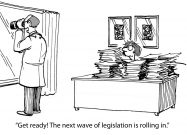Halbig and the Possibility of Supreme Court Cert
Now that the D.C. Circuit has granted rehearing en banc for the Halbig case, there is speculation about whether the case will make it to the Supreme Court. Halbig, of course, is the case addressing whether federal health care exchanges are allowed to receive federal subsidies.
The defenders of the subsidies for the federal exchanges are hopeful that the case does not reach the Supreme Court. Before the D.C. Circuit granted rehearing en banc, there was a split between the circuits, with the D.C. Circuit ruling against the legality of the subsidies and the Fourth Circuit ruling in favor of them. Cert seemed assured.
But the future decision of the en banc court of the D.C. Circuit changes things. With the three new Democratic appointees to the Court, there is now a Democratic majority and it seems extremely likely that the panel decision will be reversed – in which case, there would no longer be a split. Of course, there are other cases – a District Court in Oklahoma just held that federal exchanges cannot receive subsidies – but those circuit court decisions may take some time and there is arguably a strong need for this issue to be resolved expeditiously.
I wonder whether the Supreme Court will feel constrained from taking cert if the full D.C. Circuit decides in favor of federal exchange subsidies. Every circuit court judge who has decided the matter has voted on party lines in these cases. If the Democratic D.C. Circuit reverses, that trend will continue. And there is controversy about whether the D.C. Circuit should have taken the case en banc. In these circumstances, one might wonder whether at least four of the five Republicans on the Supreme Court will decide to hear the case, notwithstanding the lack of a circuit split.
My guess is that at least four of these five will choose to hear the case. When members of party A believe that members of party B are behaving in a partisan manner, that typically causes outrage in the members of party A (even though they may be behaving in a partisan manner as well). Whatever one thinks of Bush v. Gore, there is little doubt that one of the causes of the five Republicans voting for Bush was their perception that the Florida Supreme Court had behaved in a partisan manner.
